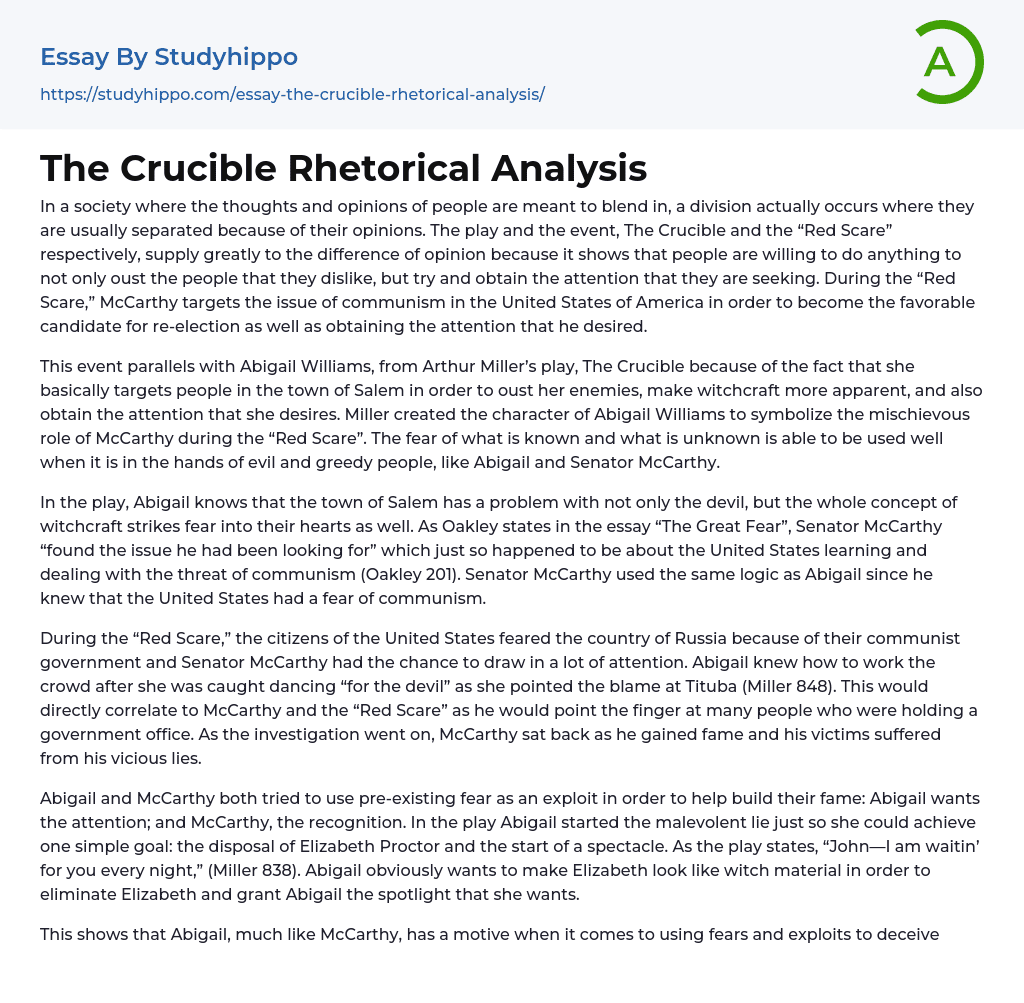In a society that prizes conformity, there is an ironic division of individuals due to their beliefs. The Crucible and the "Red Scare" event both contribute to this divergence of opinion. They show how people would go to extreme measures not only to expose those they dislike but also to gain the attention they crave. McCarthy focused on communism during the "Red Scare" with the specific aim of ensuring his re-election and satisfying his desire for attention.
The event being discussed here mirrors the actions of Abigail Williams in Arthur Miller's play, The Crucible. Abigail purposefully targets people in Salem to oust her enemies, increase awareness of witchcraft, and gain attention for herself. Miller created the character of Abigail Williams to represent the deceitful role played by McCarthy during the "Red Scare". The fear of the known and
...unknown can be effectively manipulated by malicious and greedy individuals, such as Abigail and Senator McCarthy.
Abigail and Senator McCarthy both used a similar logic in exploiting the fears of their respective communities. Abigail was aware that the town of Salem was terrified not only of the devil but also of witchcraft in general. Likewise, Senator McCarthy, as mentioned in Oakley's essay "The Great Fear", found an issue he had been seeking, which happened to be the United States' fears surrounding communism. By understanding the fears of their societies, both Abigail and Senator McCarthy were able to manipulate and take advantage of these concerns.
During the time known as the "Red Scare," there was a widespread fear among Americans regarding Russia's communist government. Senator McCarthy took advantage of this fear and gaine
significant attention. Similar to Abigail, who accused Tituba of dancing with the devil after being caught, McCarthy also targeted numerous government officials. As the investigation progressed, McCarthy rose to fame while his victims endured the consequences of his unfounded allegations.
Both Abigail and McCarthy aimed to take advantage of the existing fear for their own personal benefit. While Abigail sought attention, McCarthy craved recognition. In the play, Abigail began a harmful falsehood in order to achieve her objective of removing Elizabeth Proctor and creating a spectacle. As mentioned in the play, "John—I am waitin’ for you every night" (Miller 838). It is evident that Abigail intends to depict Elizabeth as a witch in order to eliminate her and ensure she becomes the focus.
This passage demonstrates that Abigail and McCarthy share a similar motive in using fears and exploits to deceive the town of Salem. Additionally, Senator McCarthy aims to use the presence of communism to enhance his reputation for the purpose of securing re-election. Both Williams and McCarthy exploit weaknesses and fears within the system or society, seizing the opportune moment to gain optimal attention. McCarthy himself admitted to enjoying the manipulation of others during the "Red Scare" era (Oakley 207).
During the meeting, he had the power to create chaos and uncertainty at his will, just like Abigail who could manipulate her audience. Abigail managed to persuade people that Tituba coerced her into drinking blood (Miller 847). Similarly, McCarthy captivated nearly everyone in town by discussing the Communist Party during the "Red Scare."
The manipulators took the spotlight; McCarthy for his ability to incorporate numbers and figures into his
discussions on communism, and Abigail for her talent in becoming the leader of a group of girls who hold power, according to Miller. Both McCarthy and Abigail had to navigate suspicion from their opponents, including the Democratic Party and John Proctor. McCarthy resorted to slandering those in power to manipulate his followers' thoughts, while Abigail manipulated the girls into cooperating with her to falsely accuse innocent individuals of witchcraft.
Both McCarthy and Abigail used fear and manipulation to their advantage. McCarthy's "list" of names created a sense of fear and raised concerns about communism in the US. Similarly, Abigail exploited the fear of witchcraft in Salem. Both McCarthy and Abigail started out innocent, but as they realized how easy it was to control and cause harm, they became mischievous and gregarious.
- Abolitionism essays
- Adam Smith essays
- American History essays
- American Revolution essays
- Ancient Egypt essays
- Articles Of Confederation essays
- Atlantic Slave Trade essays
- Aztec essays
- Benjamin Franklin essays
- Civil Rights Act of 1964 essays
- Civil Rights Movement essays
- Civil war essays
- Cleopatra essays
- French And Indian War essays
- Gettysburg essays
- Great Depression essays
- Hurricane Katrina essays
- Industrial Revolution essays
- Jamestown essays
- Manifest Destiny essays
- Mccarthyism essays
- Patrick Henry essays
- Pearl Harbor essays
- Pocahontas essays
- Prohibition essays
- Pyramids essays
- Salem Witch Trials essays
- Slavery essays
- The New Deal essays
- Thirteen Colonies essays
- Westward Expansion essays
- 1984 essays
- A Farewell to Arms essays
- A Good Man Is Hard to Find essays
- A Hanging essays
- A Lesson Before Dying essays
- A Long Way Gone essays
- A Rose For Emily essays
- A Separate Peace essays
- A Tale Of Two Cities essays
- A Very Old Man With Enormous Wings essays
- Adventures Of Huckleberry Finn essays
- Alice in Wonderland essays
- All Quiet on The Western Front essays
- Allegory of the Cave essays
- An occurrence at owl creek bridge essays
- Animal Farm essays
- Anthem essays
- Antigone essays
- Arthur Conan Doyle essays




